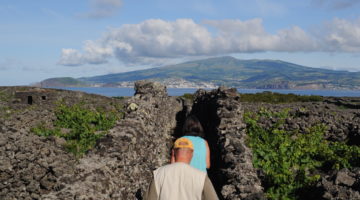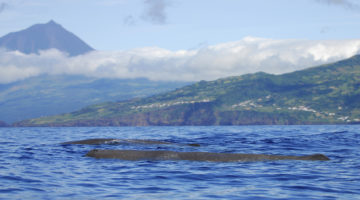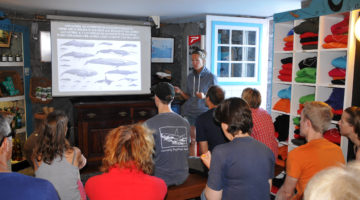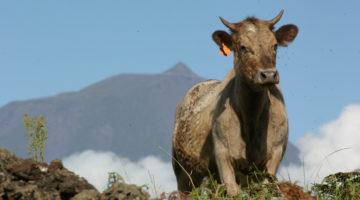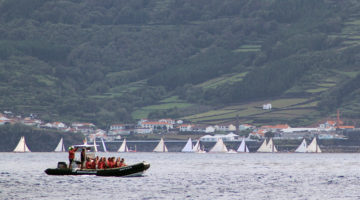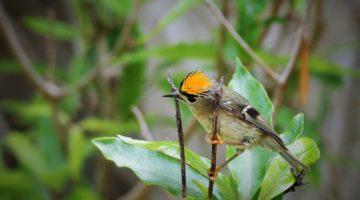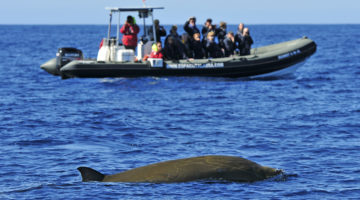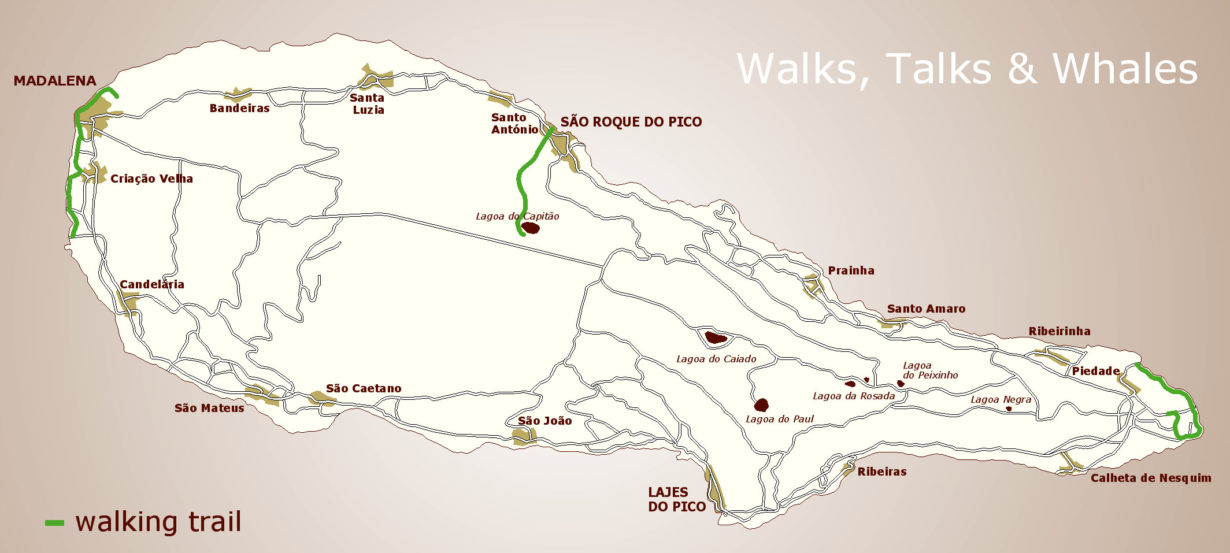Walks, talks & whales
An 8-day package that includes:
- 7 nights accommodation with breakfast in a 2 ** Hotel.
- A Road book emailed as a PDF file or sent by post with detailed descriptions of hikes and planned activities.
- Two 3-hour sea excursions based on “Whales and Dolphins of Queimada”.
- Three hikes in varied landscapes unique to Pico.
- Five talks on a variety of themes such as: Pico, volcanoes, the evolution of marine mammals, turtles, photo identification and other topics we find exciting!
- All transfers as described in “Day By Day”.
- Insurance.
- Free entrance to the Whaler’s museum.
- Government taxes and a “whale and dolphin” observation permit.
- Single passenger supplement: 230 euros.
- Single room supplement: 119 euros.
- 88 Euros reduction for a third person in a triple room.
- Sea view room supplement: 28 euros per person.
Prices are per person based on double room occupancy in a 2 ** Hotel
This trip invites you to discover the landscapes and culture of Pico, to meet the inhabitants of the Azorean sea and learn about Pico volcanoes, cetaceans, photos and more…
Walks: The hikes described in the Road Book can be a little tricky but are generally accessible to all walkers. Sometimes the itinerary can be varied, at the discretion of each walker, depending on individual abilities, knowledge of the area and physical fitness.
There are many hiking trails in Pico and it’s impossible to see them all in one week. We have selected three which represent the typical varied landscape of our island:
- The vineyards classified by Unesco as a world heritage site.
- One of the last primitive Laura silva tree forests to be found in Macronesie.
- The traditional, agricultural landscape of the eastern tip of the island.
Optional, and reserved mainly for good walkers, the opportunity to climb Pico, the highest volcano in the Azores and Portugal’s highest point (2351 meters).
Learning and understanding: Whaling and the famous ‘Verdelho’ wine have not only affected the island’s economy, but also its landscapes, the social geographical organisation of the island and the island way of life.
One can get a better understanding of the Picarotos (Pico inhabitants) by browsing their history in the Whaler museum in Lajes, the whale factory in Sao Roque and also the vine museum in Madalena. Today we are trying to develop a “softer” sort of tourism, respectful of nature and culture, as well as innovative and creative: Francois the potter, is a great example of this.
During the evening our biologists or marine guides invite you to join a variety of discussions on topics such as:
- Cetaceans, their evolution, and the dangers that threaten them.
- The turtle project. What’s happened to all of those we’ve marked since 1989?
- The “photo ID” project, or how to better recognise and therefore protect the blue and sperm whales.
- Animal photography.
- The island of Pico, its geology, flora and fauna and… the Picarotos.
Whales and dolphins: If whaling has marked more than a century of Pico’s history, especially that of the southern coast, today, the mammals we want to introduce you to today are all living and breathing.
The number of observable species, their quantity and sometimes rarity, combined with the landscape, makes the Azores undoubtedly one of the finest locations for whale watching in the North Atlantic. Here it is possible to come across 28 types of cetaceans. On average we encounter 4 or 5 species during our 3 hour excursions and rarely return empty handed
You can find a list of these animals by clicking here.
Of course we are not only interested in cetaceans; Sharks, turtles, seabirds… excite us just as much.
- D1 Saturday: Arrival transfer from Faial or Pico airport, welcome drink & information concerning the planned activities.
- D2 Sunday: Whale watching excursion (am) and Whaler’s museum (pm).
- D3 Monday: Hiking on the eastern tip of the island, visiting Francois the potter.
- D4 Tuesday: Gruta das Torres, hiking in the vineyards and visiting the wine museum*.
- D5 Wednesday: Sea excursion in the morning, an afternoon stroll to the “Vigia de Queimada”.
- D6 Thursday: Hiking in the “Laurisilva” (primitive forest) and a visit to the whale factory* in Sao Roque.
- D7 Friday: Free – See Optional Activities
- D8 Saturday: Departure transfer to Faial or Pico airport.
The description of the trip is given as a guideline. The organisers may need to change or modify the trip depending on the weather conditions*, security, number of participants and of course the presence of the whales.
- Prices are based on double room occupancy in a 2** Hotel
- Single passenger supplement: 230 Euros
- Single room supplement: 119 Euros
- 88 Euros reduction for a third person in a triple room
- Sea view room supplement: 28 Euros per person
Friday is generally a day when no activities are planned.
The day can be used for activities that had to be cancelled due to bad weather, or to embark on a “Sea watch” excursion or to climb Mount Pico (for the more athletic) – allow a full day for this long and physically demanding tour.
- For information on the “Sea watch” excursion and stopover in Sao Jorge, click here
- To book the ascent of Mount Pico, click here
A day for relaxing is often welcome after such a busy week!
Note: It is not possible to book more than one of these activities (*ask details)
 By choosing Espaço Talassa, you choose to limit your ecological footprint.
By choosing Espaço Talassa, you choose to limit your ecological footprint.
- Espaço Talassa plants trees and contributes to a “micro-reserve” project as compensation for the ecological deficit and the CO2 emissions related to our whale watching activity, in collaboration with association “Quercus”.
- For each customer €0,50 cents will be donated towards the “Cabeço Santo” (GPS position: 40º31’52″N 8º20’36″W- Google Maps) reforestation project in the mountain range of Caramulo, victim of a terrible forest fire in 2005. Soon the indigenous vegetation will substitute eucalyptus, acacias and other infesters.
It’s true: “the sea is blue because forests are green”!
30 years of experience in the Azorean sea
Our team is highly disciplinary and ethnically rich, being composed of a majority of natives but also Dutch, German, English, French, Brazilian and Spanish…
Undoubtedly one of the 10 best whale watching spots in the world
The Azores, and especially Lajes do Pico, is undoubtedly one of the 10 best whale watching spots in the world, and for sure the best in the Azores. Tourist frequentation is still small, the quantity and diversity of the whales observed is high, there’s little visual pollution and Pico mountain lies in the background.
Small boats which limit the impact on the animals
Driven by 4 stroke engines: less noise and chemical pollution… “Size matters”!
Small groups, maximum 12 people per boat
It is evidently more human!
Multimedia Briefing
Before each whale watching trip, we give an approximate 30 minute presentation on biology and animal behaviour, the history of whale hunting, ecology, legislation…
Debriefing
After each trip, have a drink and debrief with our specialists on the species observed, your doubts or questions…
Queimada look-out post, an Espaço Talassa exclusive,
A minimum of 2 look-outs direct a maximum of 3 boats. The look-outs locate the animals, and guide the whale watching boats to minimise the negative impact on the animals: manage the number of boats around the same group, manage boat speed and angles of incidence. There is therefore a strong complicity and trust between them and the skippers.
Boats equipped with hydrophones
Not only to help locate the animals, but especially to add acoustics to the visual experience
Responsible travel
By choosing to experience whale watching with Espaço Talassa, you are choosing to limit your ecological footprint. Espaço Talassa plants trees and contributes to a “micro-reserve” project as compensation for the ecological deficit and the CO2 emissions related to our whale watching activity. For each customer, approximately €0,50 cents are donated to the Project
Fair trade tourism
Espaço Talassa believes that encountering the cetaceans is educational and should be accessible for the locals: whalers’ children, youngsters, students, the less privileged… “Solidaridade“is a project which allows the inhabitants of Pico, students of any age, youth card holders, and the unemployed to encounter the whales and dolphins which cross south of Lajes do Pico by paying a symbolic sum of 30€.
Let’s lay our cards on the table:
- Our whale watching boats are fast and intended for active trips. Unfortunately, we cannot accommodate people with reduced mobility, pregnant women, or anyone with osteoporosis, sciatica, …
- Comfort on board is basic therefore it’s worth taking some precautions before embarking. The gentlemen’s WC’s are on starboard and the ladies on portside… with breath-taking views of the Atlantic!
- We put you directly in contact with nature which can also mean rain (sometimes pretty heavy) and the sun…
- As we believe that swimming with dolphins could be a risky activity for you and overall very intrusive for the animals, we stopped the activity in 2017. To learn more: Why you shouldn’t swim with dolphins
Where are the Azores?
Trace a straight line from Lisbon to New York, and in the middle of the Atlantic, you’ll find the archipelago of the Azores. The archipelago is divided into 3 groups, and in the central group, on the southern coast of Pico island, you’ll find Lajes…
- This is where Europe ends: 38 degrees North and 30 degrees West, some 800 nautical miles from the nearest coast, in the middle of the Atlantic Ocean. The Azoreans, isolated for centuries, have survived on their resources of agriculture, fishing and…. whale hunting. Melville drew inspiration from such odysseys to write his epic tale, “Moby Dick”.
- For the last 30 years, it has been strictly prohibited to harm cetaceans in the Azores.
- The sperm whale prefers the south coast of Pico. Here, assisted by Marcel, the Queimada’s lookout, you can observe the whales and get close to them. The ambition of the project goes even further as it includes an introduction into other traces and vestiges of the whaling culture and tradition, of which the people of Lajes are the last witnesses.
- Last but not least these wildlife observation holidays, which respect both the animals and the local culture, are the natural way for Azoreans to continue to remain involved with whales long after the end of whale hunting in 1984. Whale watching offers an alternative way with whales for the Lajes community, and at the same time is an ideal way to protect the giants of the sea.
- To have a Wiki-idea about the Azores, please click here
Thanks to our look-out techniques from land, we don’t leave the harbour blindly. Each morning before embarking, a briefing is held during which we take into consideration the observations made by the lookout. The type of cetacean spotted, their groups, their distance from the harbour, the sea conditions, the number of animals in the group, and the absence or presence of smaller whales are all necessary factors in assessing the quality of forthcoming excursions.
28 cetacean species frequent the Azores sea
In the interface of the North Atlantic, between “hot water” and “cold water”, the archipelago is without any doubt one of the best places for cetacean observation in the northern hemisphere. Also, because the islands are far away from the main merchant navy routes, recreational sailing has not yet made the carnage known in Continental Europe, and the large pollution emitters are relatively far off.
Tarifs
| Low Season from 10-05 to 11-01 |
Medium Season from 04-20 to 06-28 and from 09-14 to 10-04 |
High Season from 03-23 to 04-19 and from 06-29 to 09-13 |
|
|---|---|---|---|
| 8 days package | €480 | €530 | €630 |
| Walks, Talks & Whales in family (4 people) | €1500 | €1650 | €2000 |
| Supplement half-board | €126 | €126 | €126 |
| Supplement Pico climb | 69* | 69* | 69* |
| Sup full day ''Sea watch'' | €118 | €128 | €148 |
